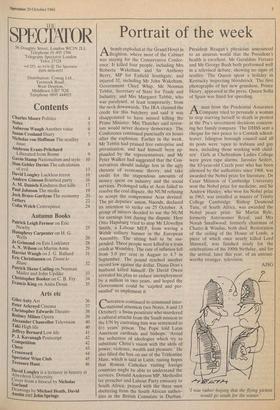Portrait of the week
Abomb exploded at the Grand Hotel in Brighton, where most of the Cabinet was staying for the Conservative Confer- ence. It killed four people, including Mrs Roberta Wakeham and Sir Anthony Berry, MP for Enfield Southgate, and injured 32, including Mr John Wakeham, Government Chief Whip, Mr Norman Tebbit, Secretary of State for Trade and Industry, and Mrs Margaret Tebbit, who was paralysed, at least temporarily, from the neck downwards. The IRA claimed the credit for this butchery and said it was disappointed to have missed killing the Prime Minister. Mrs Thatcher said terror- ism would never destroy democracy. The Conference continued punctually six hours after the explosion. Earlier in the week, ,Mr Tebbit had praised free enterprise and privatisation, and had himself been ap- plauded by the representatives, and Mr Peter Walker had suggested that the Con- servatives should indulge less in the ugly rhetoric of economic theory, and take credit for the stupendous amounts of money spent on industry and the social services. Prolonged talks at Acas failed to resolve the coal dispute, the NUM refusing to accept the compromise Acas devised. The pit deputies' union, Nacods, declared its intention to strike on 25 October. A group of miners decided to sue the NUM for earnings lost during the dispute. Herr Otto Hapsburg tried to stop Mr Llewellyn Smith, a Labour MEP, from waving a Welsh colliery banner in the European Assembly. The sitting had to be sus- pended. Three people were killed in a train crash at Wembley. The rate of inflation fell from 5.0 per cent in August to 4.7 in September. The pound reached another record low against the dollar. Diana Dors's husband killed himself. Dr David Owen revealed his plan to reduce unemployment by a million in two years, and hoped the Government could be 'cajoled and per- suaded' to implement it.
Ctastration continued to command inter-
national attention (see Notes, 6 and 13 October): a Swiss prostitute who murdered a cultural attaché from the Saudi mission to the UN by castrating him was sentenced to 81/2 years' prison. The Pope told Latin American cardinals and bishops: 'Avoid the seduction of ideologies which try to substitute Christ's vision with the idols of power, violence, wealth and pleasure.' He also lifted the ban on use of the Tridentine Mass, which is said in Latin, raising hopes that Roman Catholics visiting foreign countries might be able to understand the services. Donald Anderson MP, Methodist lay preacher and Labour Party emissary to South Africa, prayed with the three men sheltering from the South African author- ities in the British Consulate in Durban.
President Reagan's physician announced to an anxious world that the President's health is excellent. Ms Geraldine Ferraro and Mr George Bush both performed well in a televised debate, showing no signs of senility. The Queen spent a holiday in Kentucky inspecting bloodstock. The first photographs of her new grandson, Prince Henry, appeared in the press. Queen Sofia of Spain was fined for speeding.
Aman from the Prudential Assurance Company tried to persuade a woman to stop starving herself to death in protest at the Pru's investment decisions concern- ing her family company. The DHSS sent a cheque for two pence to a Cornish school- leaver. Islington borough council said all its posts were 'open to lesbians and gay men, including those working with child- ren'. Girls at Cheltenham Ladies College were given rape alarms. Jaroslav Seifert, the 83-year-old Czech poet who has been silenced by the authorities since 1968, was awarded the Nobel prize for literature, Dr Cesar Milstein of Cambridge University won the Nobel prize for medicine, and Sir Andrew Huxley, who won his Nobel prize in 1963, was installed as master of Trinity College Cambridge. Bishop Desmond Tutu, of South Africa, was awarded the Nobel peace prize. Sir Martin Ryle, formerly Astronomer Royal, and Mrs Norah Smallwood, formerly chairman of Chatto & Windus, both died. Restoration of the ceiling of the House of Lords, a piece of which once nearly killed Lord Shinwell, was finished ready for the celebrations of his 100th birthday, and for the arrival, later this year, of an untrust- worthy stranger, television.
AJSG
'I was rather hoping that the flying pickets would go south for the winter.'


















































 Previous page
Previous page